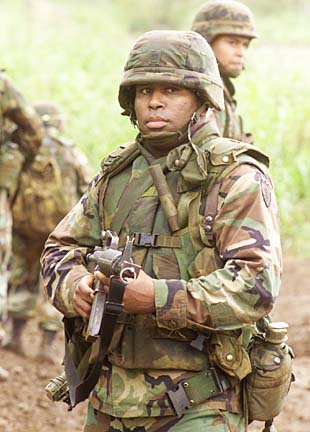


|
Preparing for battle The rain was definitely real and wet, soaking the soldiers already loaded down with their Kevlar helmets, bullet-proof vests, canteens and M-4 and M-16 rifles.
Schofield troops get ready for a
peace keeping mission to BosniaAT YOUR SERVICE
FOR YOUR BENEFITBy Gregg K. Kakesako
gkakesako@starbulletin.comThe mud was thick and gooey and also definitely real.
But the training area with its simulated bombed-out buildings was a far cry from where more than 1,600 Schofield Barracks soldiers -- the majority of them members of the 25th Division's 2nd Brigade -- will be spending the better part of next year as part of Task Force Eagle Stabilization Force 11 in northeastern Bosnia.
For six months beginning in March, the Tropic Lightning and other Hawaii-based soldiers will join 700 National Guard troops from Indiana, Wisconsin, South Dakota and Idaho to form the 2,600-member peacekeeping force. Another 850 soldiers from Russia, Turkey and Nordic countries will round out the multinational force.
The Tropic Lightning soldiers will be the 11th unit to assume the mission since U.S. troops first entered Bosnia to ease ethnic tensions between Serbs, Croats and Muslims in 1995.
It will be the first European deployment for the Hawaii-based unit under the command of Maj. Gen. Charles Swannack, a former 25th Division brigade commander and chief of staff. It was Swannack who led the Tropic Lightning's 2nd Brigade when it was deployed on its first peacekeeping mission since the Vietnam War to Haiti from 1994-95. Swannack, a 1971 West Point graduate, was nicknamed the "mayor" of Port Au Prince. He was a principal escort for President Clinton in Haiti on March 31, 1995, for the turnover of command to the U.N.

|
Swannack joins the Bosnia deployment after serving as commander of the Joint Readiness Training Center at Fort Polk which trained the last three divisions for Bosnia as well as two others for Kosovo.For the last 30 days the Bosnia-bound soldiers -- most of them members of the 2nd Brigade's 1st Battalion, 14th Infantry -- have been participating in squadron-level training at Schofield's urban fighting training area, known in Army-speak as Military Operations Urban Terrain or MOUT. There, in a setting built to resemble a devastated European village, soldiers are learning or re-learning to deal with civilians on the battlefield, convoy operations and reacting to situations they are bound to encounter: minefields, booby traps and snipers.
Capt. Clifford Harris, the officer in charge of the training, said "there are literally millions of mines in Bosnia."
Training at Schofield is at the basic level, beginning with a squad of about a dozen soldiers, teaching them to work as a team as they look towards peacekeeping operations that will entail largely patrolling missions.
Col. Andrew Twomey, 2nd Brigade commander, told reporters that "what you are seeing is the foundation skills for people deploying to Bosnia."
Twomey likes to speak in sport metaphors when explaining what the soldiers need to go through to prepare.
"This is the practice," Twomey said. "The scrimmage is in Louisiana and it will be game time in Bosnia."

|
By Louisiana, Twomey was referring to the task force's deployment to Fort Polk in a few weeks where it will be training at the platoon and company levels -- a rehearsal for the real operations in Bosnia. At Fort Polk's Joint Readiness Training Center, the Army maintains a sophisticated facility that replicates various scenarios troops in peacekeeping operations will encounter.Lt. Col. Michael Coss, commander of the 1st Battalion Golden Dragons, visited Bosnia in June as part of his orientation to prepare for the six-month deployment. He was struck by the disparity in conditions in the war-torn country.
"Our job will be to keep the area safe and secure," said Coss, a 17-year veteran on his first peacekeeping operation, "so industry can resettle and people can rebuild their homes."
While with the 10th Mountain Division, Coss said he prepared for the 1992 Somalia peacekeeping operation, but missed it when he was assigned to another unit.
Capt. Mark Hunter, 1st Battalion's C Company commander, was in Somalia for five months as a member of the 24th Division which deployed from Fort Stewart. He was struck by "its devastated landscape."
In preparing his company of 100 soldiers, Hunter was told by the officer he will be replacing in Bosnia that "the biggest problem is mines."
"Minefields are scattered throughout the country. In winter the ground freezes and after the spring thaw many of them are exposed and not always marked."
At the Schofield MOUT site, soldiers and the 10 civilians who will be supporting the division in Bosnia, spend a day in classroom before going out into the field for two days of hands-on training, ranging from mine probing and patrolling techniques to learning how to drive in a convoy and in snow.
A squad of soldiers is sent down a road where a trooper trips a mine -- actually a smoke grenade simulating an explosion -- forcing the unit to drop to the road, remove all their gear except for the bullet-proof vests, tend to the wounded soldier and then carefully examine the area for mines.
In another scenario, a squad will encounter a hidden sniper, requiring the soldiers to mark his location and then retreat to safety.
Specialist Robert Iozzia, 20, said he re-enlisted earlier this year for another three and a half years for the chance of going to Bosnia.
"I was at Fort Hood and didn't get to go anywhere during my first term," said Iozzia who joined the Army to travel right after high school. "This is going to be a good deployment -- peacekeeping operations in Bosnia are important."
Twomey said that In these troubling times "there are people there with weapons who don't like us and who are only kept in check by our ability to defeat them."